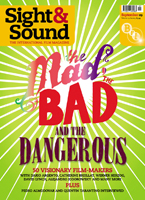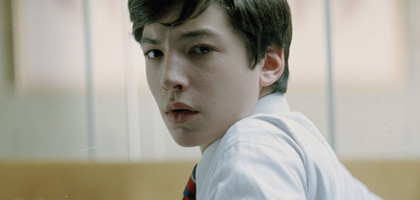Primary navigation


Focused on a loner who can only relate to 'real life' through DIY video footage, Antonio Campos' cool, brave directing debut Afterschool is a high-school movie for the alienated YouTube generation, says Lisa Mullen
High-school films have a special place in US mythology. They're a relatively recent phenomenon; although tales of troubled kids (like Rebel without a Cause or Salinger's The Catcher in the Rye) have been around since the invention of the teenager in the 1950s, the school-based paradigm didn't really become set until the John Hughes' 1980s Brat Pack movies - notably The Breakfast Club (1985) and the Hughes-scripted Pretty in Pink (1986) - which themselves spawned legions of imitators. This proliferation helped to codify a shorthand of archetypes - jocks, nerds, cheerleaders, prom queens - which became irresistible to film-makers wanting to hold up a mirror to their favourite popcorn-munching demographic.
At its most vapid, the genre presents squeaky-clean life lessons played out in a climate-controlled, acne-free universe - like the High School Musical franchise, which seeks, somewhat alarmingly, to prime the prepubescent audience with teenage aspirations. At the other end of the scale, our utter familiarity with the rigid stratifications of a notional 'high-school' system (even if we've never set foot in one) makes it the perfect place to explore the dark side of society-imposed norms and expectations; Michael Lehmann did it in Heathers (1989), and Richard Kelly in Donnie Darko (2001).
Indeed, you don't have to delve too deeply to find a seam of menace in even the chirpiest celluloid high-schools: Grease (1978) can be read as a gothic statement about nostalgia, with its nightmarishly overage teens trapped in the fake 1950s time warp; Clueless (1995) works just as well as a satire on consumption and status as it did when it was a Jane Austen novel; Fame (1980) tackles class and race as well as leg-warmered chutzpah. And of course Brian De Palma put a decisive stamp on the genre early on with Carrie (1976), proving that high school is a perfect backdrop for both a chilling mood of pervasive unease and a generous splattering of blood.
This is where Afterschool comes in. Set in an upmarket boarding school - like the recent and superficially similar novel Fall by Colin McAdam - Antonio Campos' debut gives several knowing nods to the protocols of the high-school genre, with popularity-angst and hormonal turbulence to the fore. But he's more interested in using the school's hermetic atmosphere as a laboratory for a topical inquiry into the YouTube generation. His previous project, a pair of shorts called Buy It Now in which a girl auctioned her virginity on eBay, gives a clue to his interest in the collision between the virtual and the corporeal, and this film conflates the two realms further: the audience sees everything through the human lens of a geeky loner, Robert (Ezra Miller, leading a strong cast of youngsters), who finds interpersonal relationships much harder than watching user-generated content on his computer. Adrift in a sea of unmediated content, he's addicted to fuzzy cameraphone footage - sometimes banal, sometimes perverse, sometimes violent - which for him has the thrill of pornography. He calls these pieces of footage “little clips of things that seem real”, and they have groomed him for a world-view in which flesh-and-blood experience can only be processed when it's framed and focused with an unblinking, money-shot utility.
Campos' camera (in the hands of DoP Jodie Lee Lipes) takes its lead from this idea; his film is brutally uncompromising in its refusal to play by the rules of classical cinematography. But this styleless-ness is of course highly stylised: by taking on the aesthetics of the amateur, Campos is kidding us that even the most startling shots - a telling close-up, a neat symmetry, a tricksy reflection in glass - have been blundered upon by accident. This isn't so, of course, and by putting a camera in Robert's hands, and making the plot hinge on his approach to the world as a film-maker, Campos really makes the opposite point: nothing, not even the most random piece of disposable Facebook fodder, is accidental. Everything is framed by somebody, and the author isn't dead after all.
The reason Robert is given a camera is because - in order to get close to a girl he likes, Amy (Addison Timlin) - he has joined the afterschool video club. At first they're just supposed to be taking establishing shots of the school for a group project; inevitably they turn the camera on themselves and find it gives Amy licence to play mesmerising power games with Robert's desire for her. Then Robert accidentally films the death of twin girls - the most popular in the school - who die agonisingly in a corridor after taking cocaine that's been cut with rat poison. As therapy for his trauma, he is given the job of making a video tribute to the twins. What he comes up with - an odd assortment of silences and unintentionally self-revealing interview footage - only confirms his dangerous oddity in the eyes of his adult audience. From then on Robert is stuck with the culpability which others have been desperately trying to offload; he's the victim of his own creative honesty.
Is Campos arguing that all those YouTubers and happy-slappers are misunderstood avant-garde auteurs? Or is he simply suggesting that we shouldn't rule out the possibility that these new forms of viral creativity may harbour art and truth? Authentic expression is certainly in short supply at the school, especially among the teachers, who spend most of the film's first half blithering nonsensically just out of shot. When he finally does come into view, the principal (Michael Stuhlbarg) turns out to be a monster of insincerity, using protestations of shock and grief at the double deaths to mask his panic about losing his richest pupils if a purge of drug takers becomes necessary. Every word he utters is filtered through a kind of controlling obfuscation: “There's no pressure to come up and speak,” he says during a tribute to the dead girls, “but line up here on the left.” The counsellor (Gary Wilmes) is even more slippery, offering Robert complete confidentiality, but passing every word he says on to the authorities. The kids have their own language of lies, especially when they're boasting about their sexual experiences. In the end, Robert's withdrawal and silence - which initially marked him out as an antisocial oddball - comes to seem like a perfectly sensible form of self-defence.
It's this slightly infuriating inertness which lets the film down at times and leaves the 26-year-old Campos (whose debut short as a 13-year-old was boldly dedicated to Stanley Kubrick) open to accusations of pretension. But at its best this film is brave, cool and brimful of ideas, and if they're barely contained within the slightly flimsy story, that's down to Campos' decision to give himself the safety net of a well-worn genre. Perhaps he didn't really need the school setting - the questions he's asking are strong enough on their own. Two girls die horribly, and who is to blame? Evil drug dealers? Society as a whole? Or the uninvolved bystander who can't watch and can't not watch - who steps into his own frame and then can't cope with what he finds there?